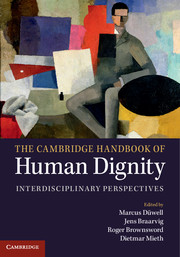Book contents
- Frontmatter
- Contents
- List of contributors
- Foreword
- Why a handbook on human dignity?
- Acknowledgments
- 1 Human dignity from a legal perspective
- 2 Human dignity: concepts, discussions, philosophical perspectives
- Part I Origins of the concept in European history
- 3 Meritocratic and civic dignity in Greco-Roman antiquity
- 4 Human dignity in the Middle Ages (twelfth to fourteenth century)
- 5 Human dignity in late-medieval spiritual and political conflicts
- 6 Human dignity in Renaissance humanism
- 7 The Council of Valladolid (1550–1551): a European disputation about the human dignity of indigenous peoples of the Americas
- 8 Martin Luther's conception of human dignity
- 9 Natural rights versus human dignity: two conflicting traditions
- 10 Rousseau and human dignity
- 11 Human dignity and socialism
- 12 Human dignity in the Jewish tradition
- Part II Beyond the scope of the European tradition
- Part III Systematic conceptualization
- Part IV Legal implementation
- Part V Conflicts and violence
- Part VI Contexts of justice
- Part VII Biology and bioethics
- Appendix 1 Further reading
- Appendix 2 Universal Declaration of Human Rights
- Index
- References
7 - The Council of Valladolid (1550–1551): a European disputation about the human dignity of indigenous peoples of the Americas
from Part I - Origins of the concept in European history
Published online by Cambridge University Press: 05 March 2015
- Frontmatter
- Contents
- List of contributors
- Foreword
- Why a handbook on human dignity?
- Acknowledgments
- 1 Human dignity from a legal perspective
- 2 Human dignity: concepts, discussions, philosophical perspectives
- Part I Origins of the concept in European history
- 3 Meritocratic and civic dignity in Greco-Roman antiquity
- 4 Human dignity in the Middle Ages (twelfth to fourteenth century)
- 5 Human dignity in late-medieval spiritual and political conflicts
- 6 Human dignity in Renaissance humanism
- 7 The Council of Valladolid (1550–1551): a European disputation about the human dignity of indigenous peoples of the Americas
- 8 Martin Luther's conception of human dignity
- 9 Natural rights versus human dignity: two conflicting traditions
- 10 Rousseau and human dignity
- 11 Human dignity and socialism
- 12 Human dignity in the Jewish tradition
- Part II Beyond the scope of the European tradition
- Part III Systematic conceptualization
- Part IV Legal implementation
- Part V Conflicts and violence
- Part VI Contexts of justice
- Part VII Biology and bioethics
- Appendix 1 Further reading
- Appendix 2 Universal Declaration of Human Rights
- Index
- References
Summary
Historical background to the Council of Valladolid
From the late-fifteenth century, the ‘discovery’ of continents and different cultures had a profound philosophical and theological impact upon the European conception of non-European and non-Christian peoples. Spain's war, conquest and ensuing colonization of the continent later denominated as ‘America’ from the beginning of the sixteenth century constitutes the political, economic and religious background to a principle moral debate on the human dignity and rights of non-European and non-Christian people. About fifty years after the ‘discovery’ of ‘America’, a disputation was organized by King Charles I of Spain (1500–58) at the Colegio de San Gregorio in the Spanish city of Valladolid during the period of 1550 to 1551. He assembled a junta (council) of fourteen distinguished theologians who were specialists in Catholic canon law – the Consejo Real de las Indias (also known as the ‘Council of the Fourteen’) – with the purpose of issuing a ruling whether the methods of war and conquest of America were just. Another important subject was the manner in which the indigenous American peoples were to be converted to Catholicism as had been demanded by various papal bulls. The current situation in colonial ‘Spanish America’ was enforced conversion to Christianity, compulsory labour, tribute and violent treatment of indigenous people within the encomienda system. King Charles I suspended the war and conquest in Spanish America until these concerns were to be resolved at the Council of Valladolid (Hanke 1959; Losada 1971; Williams 1990; Veiteberg 1994).
- Type
- Chapter
- Information
- The Cambridge Handbook of Human DignityInterdisciplinary Perspectives, pp. 95 - 100Publisher: Cambridge University PressPrint publication year: 2014
References
- 2
- Cited by



